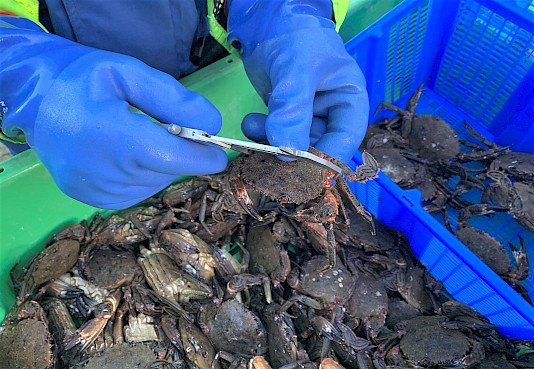Arrangements for the 2023 velvet crab closure

This year’s velvet crab closed season will take place in reduced form this summer. It will run for four weeks for boats classed as operating on the west side of Shetland followed by four weeks for those on the east.
The closure dates are:
West: Monday 10th July to Monday 7th August
East: Monday 7th August to Monday 4th September
For the avoidance of doubt, the catching of velvets can resume on the Monday 7th August for west boats and Monday 4th September for east boats.
Fishermen should inform the SSMO as soon as possible if they have switched to fishing on a different side of Shetland this year.
There has been a considerable delay in fixing the closure arrangements this year due to exceptional circumstances. These included the need to respond to unprecedented changes in velvet breeding and moulting patterns.
The SSMO also needed to recognise the increased economic pressures on the two vivier truck buyers and there have been difficulties for the SSMO in getting scientific advice due to a temporary lack of scientists.
Last week the SSMO board received fresh scientific advice based on the early provisional results from the stock assessment from landings in 2022. It showed an upward swing on the landings per unit effort (LPUE) last year. This means more velvets per creel and reduced effort on the fishery.
This upturn contrasted with a sharp drop in LPUE seen from the 2021 assessment. Had that slump continued then the SSMO would have been required to further restrict or possibly even close the velvet fishery next year under its Harvest Control Rules.
Due to the brighter picture presented and the problems caused by a slow fishery in 2023 it was agreed to half the usual length of the closure period.
The board is clear that buyers should ensure that soft and otherwise sub-standard velvets are not accepted from licence holders. The fishery office plans to increase monitoring over the summer. Inspectors will be looking for soft as well as berried and undersized velvets, which are all banned under SSMO regulations.
Meanwhile, scientists contracted to the SSMO are finalising plans to analyse what a few fishermen are catching each month before discarding. This so-called red bag scheme will monitor different parts of Shetland to help build up a picture of the velvets’ changing habits.
It is also proposed that a velvet tagging project takes place to monitor movement and moulting cycles etc.

